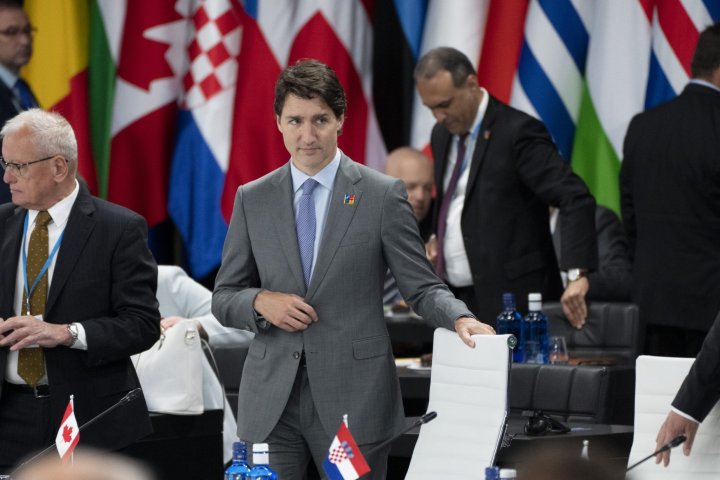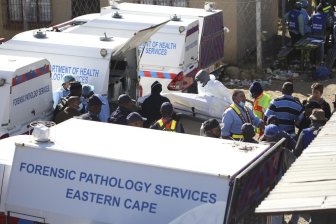
The welcoming of Sweden and Finland into NATO will put additional pressure on Canada to boost its own defence spending and contributions to the military alliance, experts say.
The two Nordic countries were formally invited to join the alliance Wednesday, marking one of the biggest shifts in European security in decades after Russia’s invasion of Ukraine pushed Helsinki and Stockholm to drop their tradition of neutrality.
Once the move is ratified and Sweden and Finland add their well-trained armies to NATO’s ranks, “the question will be, why is Canada, one of the wealthiest countries on the planet … not improving our ability to protect our sovereignty,” said Aurel Braun, a political science professor at the University of Toronto.
“Right now, what we are contributing is not enough.”
Canada has yet to publicly commit to the alliance’s target for all members to spend at least two per cent of the national gross domestic product on defence, which was first agreed to in 2014.
New numbers released by NATO on Monday projected Canadian defence spending will actually fall as a share of GDP to 1.27 per cent this year compared to 1.32 per cent last year and 1.42 per cent in 2020.
Speaking Wednesday at a NATO summit in Spain attended by Prime Minister Justin Trudeau and his foreign and military ministers, NATO Secretary-General Jens Stoltenberg said all countries should treat the two per cent target as “the floor, not as the ceiling,” as the world grows more dangerous amid Russia’s aggression.
Stoltenberg told reporters that he understands the desire to spend taxpayer dollars on health care, education and infrastructure. But he added he still expects “all allies to meet the guidelines that we have set” for defence spending, “including Canada.”

Braun agrees that welfare spending is important, but says Sweden and Finland are proof that countries with strong social safety nets can also meet the targets set by NATO. Finland already spends more than two per cent of its GDP on defence, while Sweden has publicly vowed to reach the same threshold by 2028.
“So what (is Canada) waiting for?” he asked.
Canada on Wednesday signed an agreement to upgrade the NATO battlegroup it leads in Latvia to a brigade, which will mean doubling the number of troops to between 3,000 and 5,000.
However, the government says it’s too early to confirm whether that will entail deploying additional Canadian troops as part of the upgrade.
Robert Baines, president of the NATO Association of Canada, said the announcement of an upgraded force in Latvia indicates Canada’s dedication to the alliance.
“This is a strong message of continued support for NATO which will allow Canada to draw attention to the capabilities and contributions that the Canadian Armed Forces bring to NATO operations and which will help balance out the lacklustre metric of our low defence spending,” he said in a statement.
Pressed on Canada’s defence spending Wednesday, Foreign Minister Melanie Joly said Canadians can be proud of the country’s work within NATO and in the Ukrainian conflict in general, and emphasized the role of diplomacy in responding to Russia’s aggression.
The parliamentary budget officer said in a report this month the federal government would need to spend an additional $75.3 billion on defence over the next five years for Canada to reach NATO’s target of two per cent of GDP.

Earlier this year, the federal budget promised $8 billion in additional spending on defence, part of what the government frequently describes as a 70 per cent increase in defence spending, first outlined in the 2017 defence policy reset.
Yet there are still questions how much of that $8 billion — if any — will be used for the $4.9 billion in upgrades to NORAD radar and surveillance systems announced last week.
Gen. Wayne Eyre, chief of the defence staff, told Global News’ The West Block last week that he doesn’t know where that money for NORAD is coming from.
A defence spending boost with a focus on NORAD is considered necessary to protect Canadian sovereignty in the Arctic, and counter efforts by Russia and China to assert a greater presence in the region.
Braun says Sweden and Finland will be able to help Canada and the rest of NATO on that front, while also limiting Russia’s aggression elsewhere.
“These are two Arctic states … who will also prevent Russia from making the Baltic Sea into a Russian lake,” he said, noting Finland itself shares a border with Russia.
“It completely changes the regional picture.”
Sweden and Finland’s inclusion in NATO will also mean that every member of the Arctic Council — except for Russia — will be a member of the military alliance, further weakening Moscow’s influence.

“One of the most important messages from President Putin … was that he was against any further NATO enlargement,” Stoltenberg said Tuesday evening. “He wanted less NATO. Now President Putin is getting more NATO on his borders.”
Braun struck a similar argument.
“They were driven to this,” he said, referring to Sweden and Finland.
“It tells us that not only does Russia have agency, that Russia is not a victim, but Russia has managed to alienate two countries that were so hard-working at having good relations that Russia has become a rogue state.”
— With files from Global’s Amanda Connolly and the Canadian Press
© 2022 Global News, a division of Corus Entertainment Inc.


